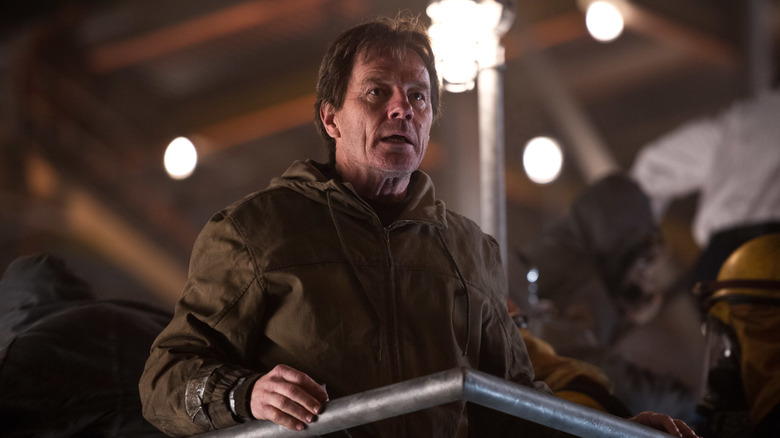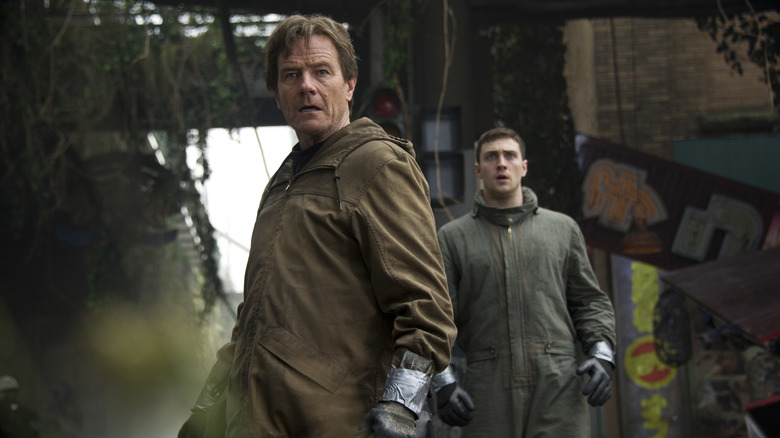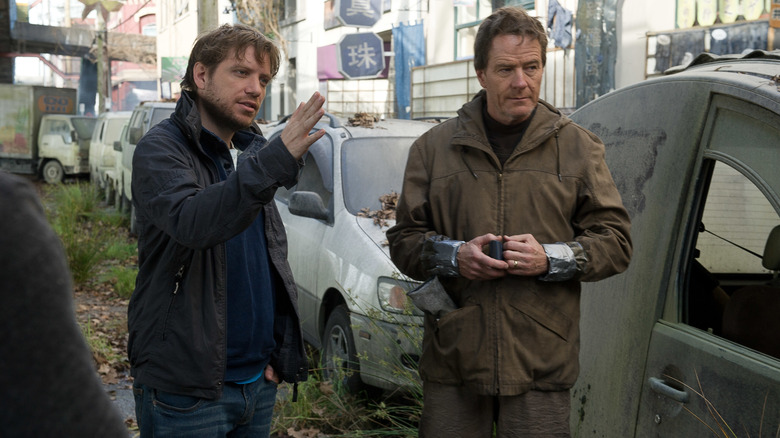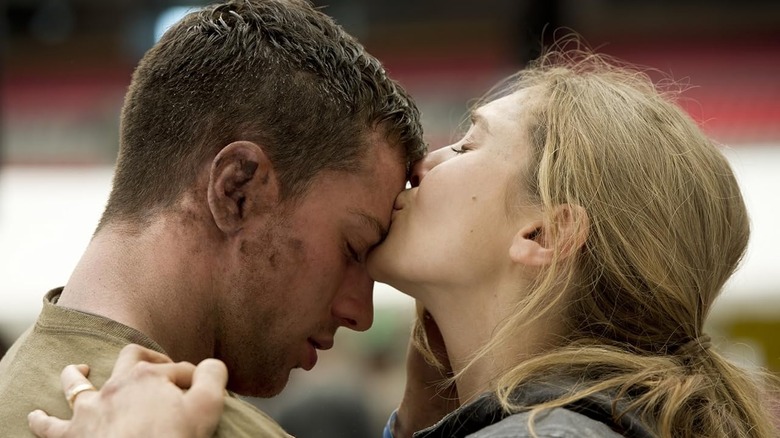Bryan Cranston Always Knew His Godzilla Death Was A Big Mistake
As exciting as it is to watch a massive kaiju stomp its way through civilian territory, monster movies are nothing without an evocative, empathetic cast. You need someone to root for while Godzilla lays waste to the world, a point that last year's "Godzilla Minus One" wasted no time proving.
The 2023 Toho film struck the perfect balance between human drama and monstrous spectacle, and retroactively put America's own MonsterVerse to shame. It's no secret that Legendary Pictures' kaiju films, while visually exciting, don't offer much in the emotion department. In "Godzilla: King of the Monsters" and "Kong: Skull Island," the eponymous Titans are meant to be the true protagonists. The human cast are frequently relegated to time-worn Action Movie Tropes as a result, which doesn't make for a very dynamic or compelling experience.
It all began with 2014's "Godzilla," the Gareth Edwards film that brought the Titan back into the limelight. While thrilling at the time, especially on the big screen, "Godzilla" feels particularly boring in hindsight. The film is about as restrained a slow burn as you can get: Edwards took a page from "Jaws" in teasing the titular kaiju, while usually-charismatic actors like Aaron Taylor-Johnson and Elizabeth Olsen are kind of just ... there. It's hard to care about the duo, who play a married couple experiencing Godzilla's reemergence from opposite sides of the world — especially since "Godzilla" already had a perfect protagonist in Bryan Cranston's Joe Brody, only to senselessly kill him off before the story could really begin.
'What a waste'
Throughout its first act, "Godzilla" dangles a near-perfect conflict before our very eyes. It's Cranston that brings us into the action as Joe, a scientist monitoring a nuclear power plant in Japan. He loses his wife Sandra (an utterly wasted Juliette Binoche) when a newly-hatched kaiju triggers a reactor meltdown, and he dedicates the rest of his life to uncovering the source of the tragedy.
Unfortunately, we don't get to see much of that from Joe's perspective. "Godzilla" jumps forward 15 years, leaving Joe's son Ford (Taylor-Johnson) to fill us in on the exploits of his now-estranged dad. Joe has unwittingly uncovered a decades-spanning conspiracy involving Godzilla and other creatures dubbed "MUTO" (Massive Unidentified Terrestrial Organism), but no one really believes him until a new MUTO emerges in Japan. He and Ford just happen to be there investigating, and Joe is unfortunately killed during yet another natural disaster.
Joe's death is certainly meant to be tragic, but it also takes some major wind out of this story's sails. Cranston seems to agree. He hasn't been shy about his disappointment concerning "Godzilla," or his character's death. "That character dying at that time was a mistake," he told the Nerdist podcast in 2015. "I knew it when I read [the script]. When I read it I said, 'Oh, [at] page 50 this character who was the emotional core at the center, that was guiding the audience in the story up to that point — he dies?' What a waste."
Godzilla's missed connection
For the record, Cranston isn't 100% averse to the idea of Joe biting the dust. The actor simply believed that he was killed off way too soon, before the emotional connection between Joe and Ford could be restored. "Godzilla" achieves some real emotional stakes when focusing on their strained relationship.
Cranston argued that Joe should have spent more time with Ford, to give the characters more time to bond. Establishing a clear goal for Joe outside of the hunt for MUTO would have also been key: reconnecting with his son would give the character the chance to return to a normal life, and to be reintroduced to Ford's own son, Sam. It could have carried the film into its big climax, and given audiences something real to root for:
"Just when they're bonding and it looks like they could have a relationship, the father sacrifices himself to save his son. That's the way he should have died."
The "Breaking Bad" actor made sure to pitch this idea to Edwards and his team: "I told them that even if I wasn't doing this role, that character shouldn't die at that point. It's just bad narrative." Unfortunately, production was too far along by the time Cranston was cast as Joe:
"I was the last guy hired because I was still shooting 'Breaking Bad' and they kept pushing [production] because 'Breaking Bad' kept pushing. Finally, I was able to get in and do it."
The MonsterVerse needs humans, too
After Joe's death, Ford and his wife Elle (Olsen) take over as the film's main protagonists. It doesn't really work — mostly because they don't get to spend much time together either — but by the time Godzilla makes his real appearance in the final act, all is basically forgiven.
Cranston does still appreciate "Godzilla" for the "fun" movie it is, but Joe's ill-timed demise remains a sticking point. "They kind of dealt with it poorly," he continued. "That's my only criticism of it because I think it was a fun movie; it was a very successful movie."
The MonsterVerse has since expanded to focus on Godzilla's rivalry with other kaiju like King Kong, Mothra, and Gidorah, but the films are still struggling to elevate their human characters beyond flattened archetypes. Hopefully that can change with upcoming entry "Godzilla x Kong: The New Empire," which is set to bring back some of the MonsterVerse's more compelling characters. Of course, the Titans are the stars of the show — and always have been — but it still doesn't hurt to try and ground these monsters movies in some genuine human drama.



